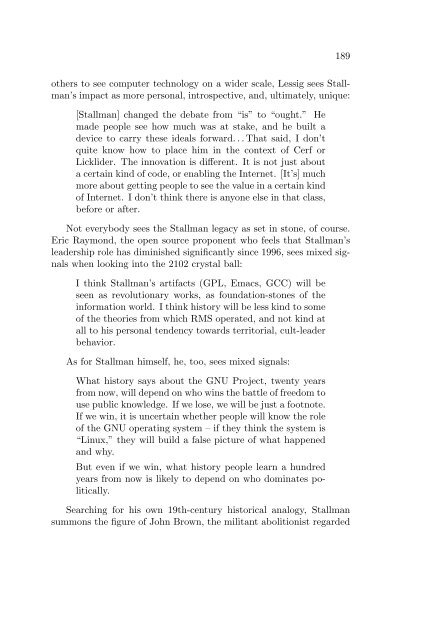Create successful ePaper yourself
Turn your PDF publications into a flip-book with our unique Google optimized e-Paper software.
189<br />
others to see computer technology on a wider scale, Lessig sees Stallman’s<br />
impact as more personal, introspective, and, ultimately, unique:<br />
[Stallman] changed the debate from “is” to “ought.” He<br />
made people see how much was at stake, and he built a<br />
device to carry these ideals forward. . . That said, I don’t<br />
quite know how to place him in the context of Cerf or<br />
Licklider. The innovation is different. It is not just about<br />
a certain kind of code, or enabling the Internet. [It’s] much<br />
more about getting people to see the value in a certain kind<br />
of Internet. I don’t think there is anyone else in that class,<br />
before or after.<br />
Not everybody sees the Stallman legacy as set in stone, of course.<br />
Eric Raymond, the open source proponent who feels that Stallman’s<br />
leadership role has diminished significantly since 1996, sees mixed signals<br />
when looking into the 2102 crystal ball:<br />
I think Stallman’s artifacts (GPL, Emacs, GCC) will be<br />
seen as revolutionary works, as foundation-stones of the<br />
information world. I think history will be less kind to some<br />
of the theories from which RMS operated, and not kind at<br />
all to his personal tendency towards territorial, cult-leader<br />
behavior.<br />
As for Stallman himself, he, too, sees mixed signals:<br />
What history says about the GNU Project, twenty years<br />
from now, will depend on who wins the battle of freedom to<br />
use public knowledge. If we lose, we will be just a footnote.<br />
If we win, it is uncertain whether people will know the role<br />
of the GNU operating system – if they think the system is<br />
“Linux,” they will build a false picture of what happened<br />
and why.<br />
But even if we win, what history people learn a hundred<br />
years from now is likely to depend on who dominates politically.<br />
Searching for his own 19th-century historical analogy, Stallman<br />
summons the figure of John Brown, the militant abolitionist regarded


